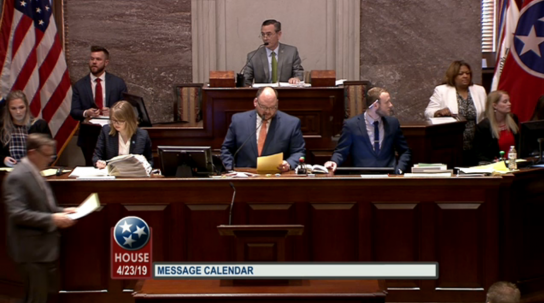
Today the House of Representatives voted 50-48 for Governor Bill Lee’s Education Savings Account (ESA) proposal after three hours of debate. The Senate plans to vote on its version of the legislation on Thursday.
Tennessee Disability Coalition Statement on the Education Savings Account proposal
The Tennessee Disability Coalition (The Coalition) is an alliance of organizations and individuals joined to promote the full and equal participation of children, youth, and adults with disabilities in all aspects of life. The Coalition and its member organizations represent Tennesseans of every age, economic background, political persuasion and disability. The Coalition supports educational policies that ensure that every child should have access to an education preparing them for positive long-term outcomes including gainful employment and meaningful community involvement. This includes protections for students to access special education services that they need in all education reform initiatives.
We would like to thank Governor Lee for committing to making education a top priority in his first year. However, members of our Coalition have expressed concerns over the Education Savings Account proposal (SB 795/ HB939) and its potential impact on students with disabilities. In its present form the proposal does not appear to be designed to serve students with the most need and may result in educational practices that lead to exclusion and discrimination for students with disabilities.
The Education Savings Account (ESA) proposal would require families of students with disabilities to waive their rights to protection under the Individuals with Disabilities Act (IDEA) in order to participate. These rights include accommodations for assessments or instruction, disciplinary protections, and/or access to services as a part of a student’s Individualized Education Program (IEP). If a student accepted an ESA, many parents would not realize that this means a student receiving special education services would lose their rights to a free and appropriate public education (FAPE). The proposed legislation states that the Department of Education will “strive to ensure that parents of students with disabilities receive notice that participation in the program has the same effect as a parental refusal to consent to the receipt of services under the IDEA.” Members of the Coalition believe that informing parents of this information prior to acceptance of a voucher needs to be a top priority. Waiver of rights should be documented.
Under current provisions of the bill, school choice is not guaranteed. Schools approved by the Education Savings Account Program cannot discriminate based on race, color, or national origin. However, they can otherwise abide by their current admissions criteria even though they would be receiving state funding through the vouchers. Noticeably, disability is not explicitly stated in these protections from discrimination. Thus, the ESA Program does hold the potential to create private schools that are once again segregated for students with disabilities, despite all the progress that has been made in inclusionary programs and practices. According to Brown v. Board of Education, “where the state has undertaken to provide an educational opportunity, it must be made available to all on equal terms.” Students with the most significant disabilities would likely not be accepted at most private schools. The current proposal could leave students with disabilities with few options available to them.
Many students with disabilities have families struggling financially due to the additional costs that come from raising and caring for a child with significant disabilities. ESA legislation proposes an approximate $7,300 that a family could receive to cover the cost of a private education. For the majority of private schools, this would not be enough to cover the costs, leaving students with disabilities unable to participate in the ESA Program. Additionally, current funding states that public schools will have the dollars lost to the ESA Program replaced for only three years. After these three years, there is concern over how public schools are to provide the same level of services with fewer resources as these funds continue to be diverted to private schools.
Tennessee has made significant improvement in educational outcomes for students with disabilities through the public schools and Division of Special Education. Much of this improvement has been a result of collaboration between the Department of Education and members of the community. Members of our Coalition believe this would not be a step in the right direction for students with disabilities. As of 2017, students with disabilities who receive services under IDEA accounted for over 13% of the current public school population in Tennessee. We need to make sure these children are served appropriately as a part of the 1 million public school students in Tennessee, investing funding and legislation for their success. We are committed to working with Governor Lee to assist him in his priority of improving education for all students in Tennessee.